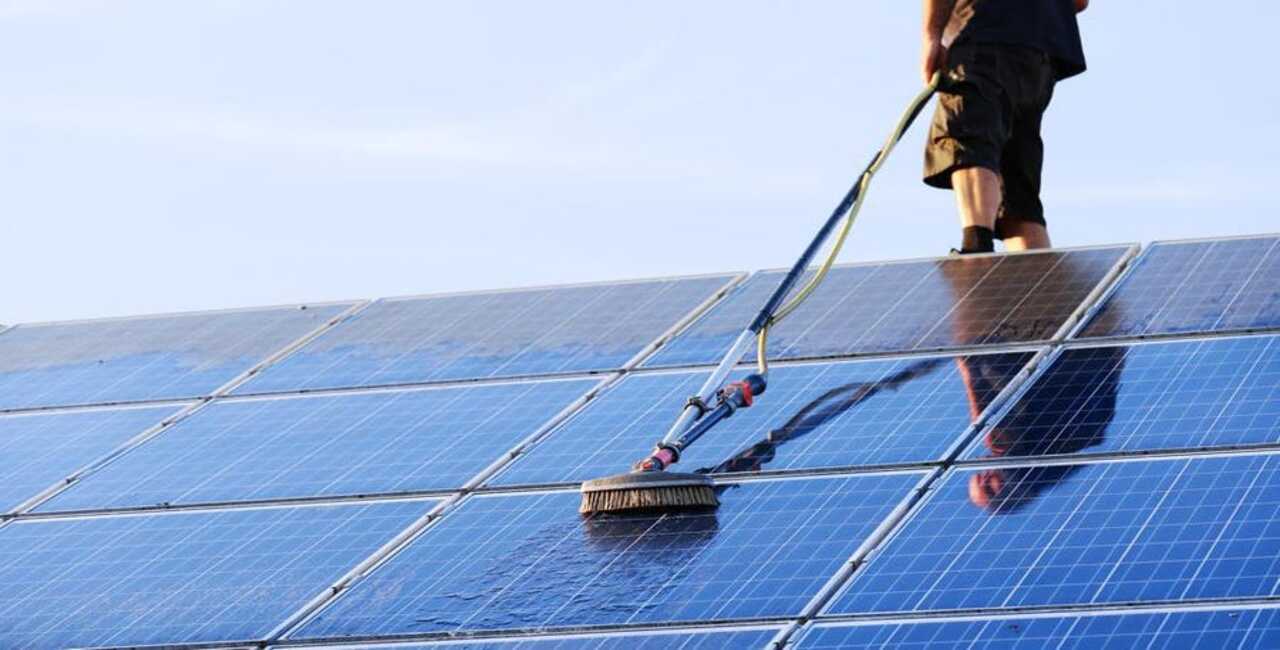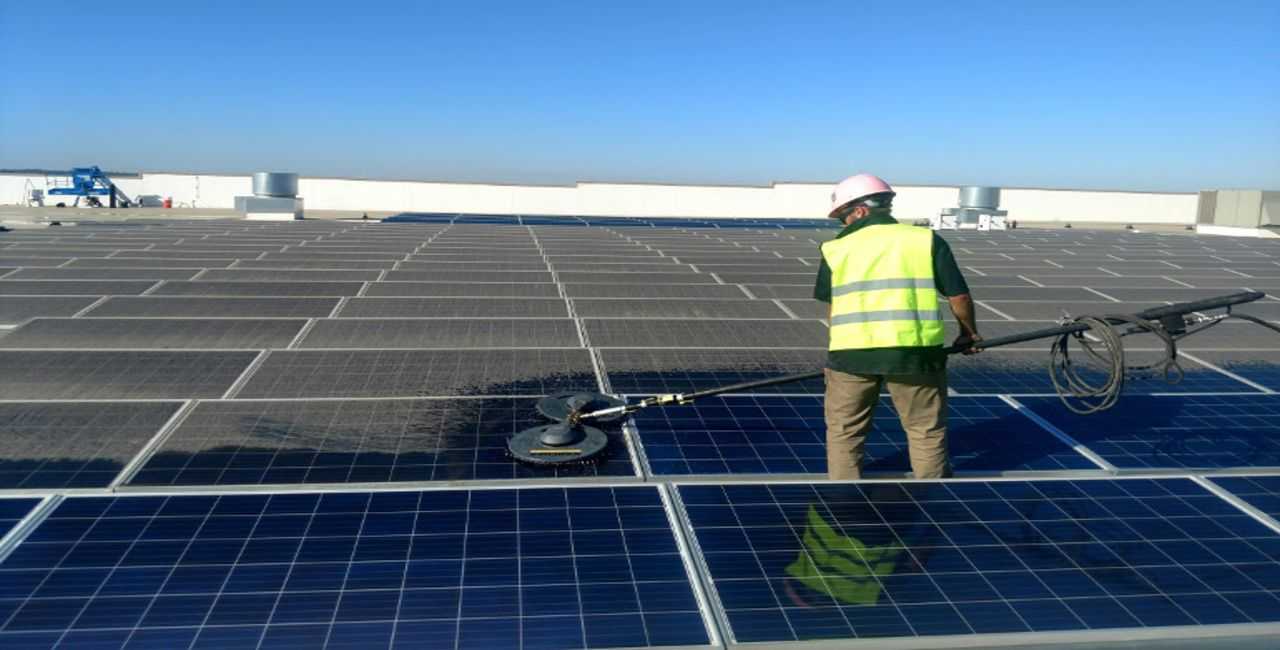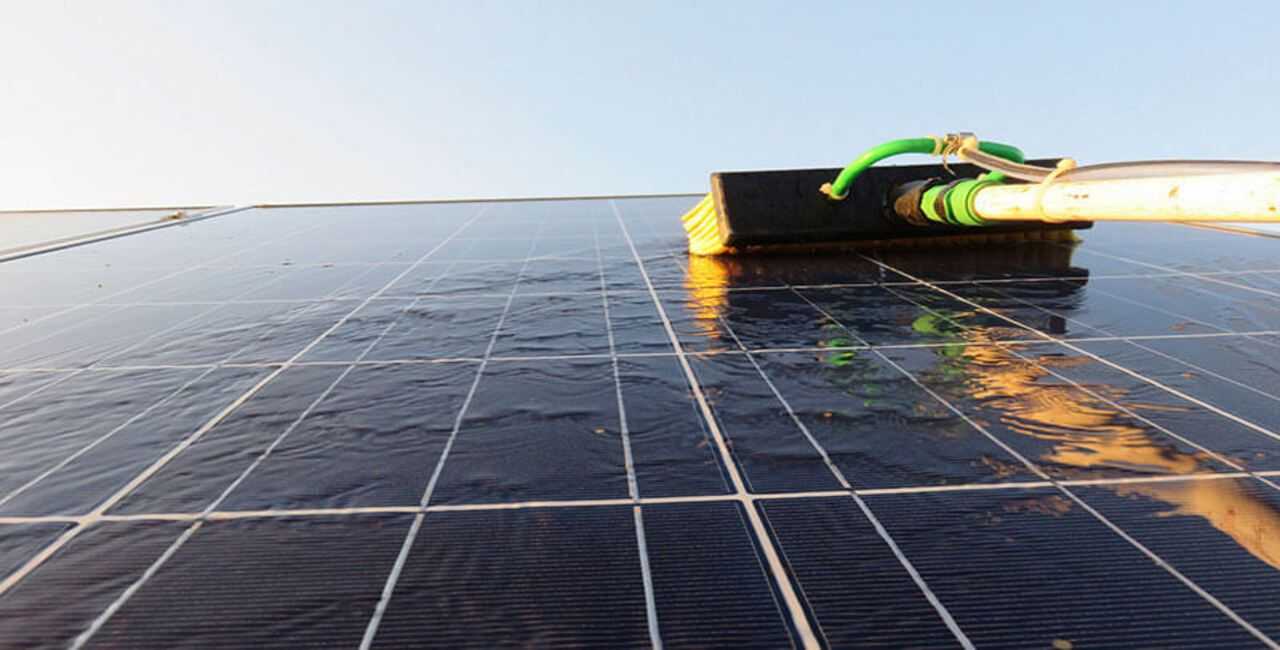Why Solar Panel Cleaning Matters and How to Do It Properly

One of the most widely used renewable energy sources worldwide is solar energy, which is rising quickly. More and more homes and companies are installing solar panels to generate power in response to the rising need for renewable energy.
Although solar panels are intended to be low-maintenance, they still need to be cleaned on a regular basis to maintain their effectiveness and lengthen their lifespan.
In this article, we'll look at the importance of solar panel cleaning and how to do it right. In this article, we'll go through the numerous aspects of solar panel performance that can be impacted, such as dirt, dust, debris, and bird droppings, as well as how routine cleaning can assist to improve performance.
Additionally, we'll go over step-by-step directions for safely and successfully cleaning your solar panels and provide some advice on how to keep them clean over time.
By adhering to these recommendations, you can make sure that your solar panels run as efficiently as possible and continue to give you clean, sustainable energy for many years to come.
Why Regular Solar Panel Cleaning is Important
A clean energy revolution is impossible without solar panels since they help cut carbon emissions and lessen reliance on non-renewable energy sources. The efficiency and lifetime of solar panels may be considerably impacted by solar panel cleaning, although many households and companies disregard its significance.
The Importance of Cleaning Solar Panels
For your solar panels to work at their best, frequent cleaning is necessary. The surface of the panels is susceptible to the accumulation of dust, dirt, debris, and bird droppings, which lowers the quantity of sunlight that reaches the cells and reduces their ability to produce electricity.
Sometimes, a buildup of dirt might prevent up to 30% of the sunlight from reaching the panels, thus decreasing their effectiveness.
Additionally, the buildup of debris can result in hotspots, which can permanently harm the solar cells. These hotspots develop when a section of the panel is covered or shaded while the remainder of the panel is still exposed to direct sunlight.
This might lead to an increase in cell damage and overheating in the shadowed area, which would reduce the panel's overall efficiency.
Benefits of cleaning solar panels:
- Improved Efficiency: Maintaining maximum efficiency and energy production with regular cleaning will help you get the most out of your investment. Studies show that cleaning solar panels can boost their effectiveness by 20%.
- Longer longevity: By clearing away dangerous material, you may keep the solar panels from becoming damaged and so increase their longevity. Solar panels may endure up to 25 years or more with regular maintenance.
- Cost savings: You may lower your energy costs and save money over time by maximizing the effectiveness of your solar panels. Regular cleaning can also avoid the need for expensive repairs or replacements caused by neglect-related damage.
The effectiveness and longevity of solar panels can both be greatly impacted by dirt and debris. Solar panels' capacity to collect sunlight is diminished by the buildup of dust, grime, and other debris, which diminishes energy production. Depending on how much of a buildup there is, this drop in energy production might be as little as a few percentage points or as much as 20% or more.
Over time, dirt and debris can physically harm solar panels in addition to lowering energy output. As dirt builds up on the panels' surface, it may scrape or abrade them, causing microcracks and harm to the solar cells. The panels' lifespan may be shortened as a result, and the risk of expensive repairs or replacements may rise.
You can maximize the energy output of the panels, increase their longevity, and make the most of your investment in renewable energy by keeping the panels clean.
By eliminating dirt, dust, and other material that might obstruct sunlight and lower energy output, routine solar panel cleaning increases the efficiency and durability of solar panels.
Additionally, it can guarantee peak performance and guard against any damage to panels, increasing energy savings and lowering maintenance costs.
When to Clean Solar Panels

Periodic cleaning of solar panels is necessary to maintain optimal efficiency and maximize energy production. The frequency of solar panel cleaning is influenced by a number of variables, including climate, location, and surroundings.
For instance, places with higher concentrations of dust, grime, or pollution could need cleaning more frequently than those with cleaner air.
Solar panels should generally be cleaned at least once or twice a year. However, this may change according to the environment and solar panel type. For instance, cleaning solar panels placed in dusty places could be necessary more frequently, perhaps every three to six months.
In contrast, washing solar panels in relatively clean places could only be necessary once or twice every two years.
It's critical to plan routine cleaning of solar panels to keep them clear of accumulation, dust, and other debris. The last time the panels were cleaned and the date of the subsequent cleaning may be tracked using a cleaning schedule.
This can guarantee that the solar panels continue to operate at their best and provide the most amount of electricity possible.
The frequency of cleaning solar panels depends on a number of parameters, such as:
Climate: Locations with a lot of rain may have cleaner air and need cleaning less frequently. In contrast, regions with less rainfall may see greater accumulations of dust and filth, necessitating more regular cleaning.
Location: Solar panels located near construction sites or in high-traffic areas may collect more dust and debris, necessitating more regular cleaning.
Shading: Solar panels may acquire waste more rapidly and require more regular cleaning if they are severely shadowed by surrounding trees, buildings, or other objects.
Orientation: Because they receive more sunshine and may collect more dust and grime, solar panels that face the south or west need to be cleaned more frequently.
Angle: How often solar panels need to be cleaned might also depend on their angle. A higher slant on the panels could make it easier for dirt and debris to fall off, needing less regular cleaning.
Solar panels should be cleaned at least once or twice a year based on these considerations.
However, more regular cleaning may be required, maybe every three to six months, in places with high levels of dust, debris, or pollution. Organizing cleaning during the dry season, when panels are not moist, is particularly crucial since it may help stop the accumulation of mineral deposits.
Solar panels can continue to function properly and keep clear of dirt with regular cleaning, maximizing energy output and lowering the need for expensive repairs.
How to Clean Solar Panels
Solar panels must be properly maintained in order to last for a long time and work at their best. Regular solar panel cleaning is a crucial component of maintenance. Solar panels that are dirty or dusty will produce much less electricity, which will limit their efficiency and perhaps cause damage.
We will provide you with a thorough explanation of the cleaning procedures for solar panels in the following:
- Step 1: Safety first
It is crucial to make sure you are safe before starting any cleaning process. Since solar panels are frequently put on a building's roof, it's important to take safety measures to prevent falls and injuries. Use a strong ladder, wear suitable footwear, and make sure the roof is sturdy and secure to walk on. If you're concerned about your safety, you might want to get the cleaning done by a specialist. - Step 2: Shut the system down
It is crucial to turn off the system before cleaning the solar panels in order to prevent potential electrocution. Find the main switch or breaker and disconnect the solar panels' power source. - Step 3: Evaluate the Panels' Condition
Look for any damage, fractures, or loose connections on the solar panels. Before attempting to clean the panels, call a professional for repairs if you discover any damage or issues. - Step 4: Clean Up the Debris
Use a soft-bristled brush or a leaf blower to remove any substantial material from the solar panels' surface, such as leaves, branches, or bird droppings. Take care not to scratch the panels' surface. - Step 5: Water Rinse
Rinse the solar panels with water using a garden hose to get rid of any leftover dust or dirt. You can rinse the panels with a low-pressure power washer if they are very filthy. - Step 6: Clean with a soap solution
If the solar panels are still unclean, prepare a pail of water with a mild soap solution. Apply the soap solution to the panels' surface using a soft-bristled brush, then scrub the surface with care to get rid of any dirt or grime. To get rid of any soap residue, give the panels a good water rinse. - Step 7: Dry the panels.
The solar panels may be gently dried with a clean, soft towel or left to air dry. Avoid utilizing items that might scratch the panels' surface, such as abrasives or rough materials. - Step 8: Switch the system on
Turn on the solar panels' power source once they have dried out and keep an eye on how they are doing to make sure they are operating properly.
In order to clean solar panels safely and effectively, a few certain tools and materials are needed. You will require the following items:
Soft-bristled brush: To clean the solar panels' surface of particles without scratching them, a soft-bristled brush is required.
Non-abrasive sponge: To remove dirt and grime from the panels' surface, add soap solution to a non-abrasive sponge and gently scrape.
Bucket: To combine the soap solution, you will need a bucket.
Soap solution: Cleaning solar panels is advised using a mild soap solution mixed with water and dish soap. Avoid using aggressive cleaners or chemicals that might damage the panels' surface.
Hose or pressure washer: When the solar panels have been cleaned of dirt and soap solution, they may be rinsed using a garden hose fitted with a spray nozzle or a low-pressure power washer.
Ladder: If the solar panels are mounted on a roof, a reliable ladder is required to access them.
Safety gear: When cleaning solar panels, safety should always come first. To prevent harm, put on the proper clothing, gloves, and eye protection.
Microfiber cloth or squeegee: After cleaning the solar panels, use a clean, soft microfiber cloth or squeegee to dry the surface and get rid of any last traces of water.
When cleaning your solar panels, keep in mind to abide by all safety precautions and manufacturer's instructions to prevent damage and guarantee peak performance.
Tips for Safe and Effective Solar Panel Cleaning

Here are some best cleaning practices and safety advice for solar panels:
Safety first: Be cautious to cut off the power supply before cleaning your solar panels. By doing this, you may work safely while cleaning.
Use the Right Equipment: To clean the solar panels, use a warm water bucket, a soft-bristled brush, or a non-abrasive sponge. Abrasive tools and strong chemicals should not be used since they can scratch the surface.
Schedule Regular Cleaning: To avoid the accumulation of dirt, dust, or debris, schedule routine cleaning of your solar panels. Maintaining a regular cleaning plan will guarantee that your solar panels function at their best.
Timing Matters: The optimum time to clean your solar panels is early in the day or late at night, when they are cool to the touch. It is best to avoid cleaning the panels while the sun is at its strongest since the water will evaporate more rapidly and produce streaks.
Be Cautious on Roofs: Use a ladder that is long enough to safely access the roof if your solar panels are put there. To avoid slipping and falling, put on boots or shoes with traction.
You can make sure that your solar panels are cleaned safely and properly and that your solar energy system is operating at its peak efficiency by adhering to these safety guidelines and best practices.
Conclusion
For your solar energy system to operate at its best and last as long as possible, routine solar panel cleaning is essential. Solar panels can lose their efficiency due to the buildup of dirt, dust, and debris, which will limit energy output and increase energy prices.
You can make sure that your solar panels are cleaned correctly and safely according to the safety recommendations and best practices provided in this article. The most important things to bear in mind when cleaning include frequency, tool selection, and cleaning times of the day.
Making cleaning a frequent part of your maintenance regimen is therefore crucial if you want to get the most out of your solar panels.
By doing this, you may reap the long-term advantages of solar energy that are safe, effective, and affordable.

